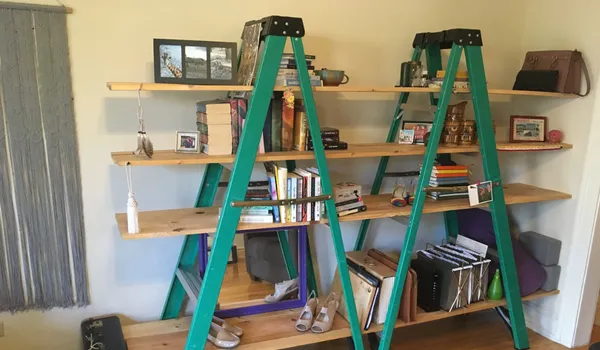
Clutter vs. My Mental Health
It’s pretty well documented at this point that clutter increases stress levels. Just google - “clutter stress levels” and a bunch of studies and articles will come up (it’s super interesting). But this blog post is under the “personal” section of my website, so I’m not going to go into the studies. I’m just going to give you my experience of how clutter contributed to my poor mental health, the strategies that I used to reduce my clutter, and the overall impact that had on me.
How clutter contributed to my poor mental health.
Let me start by saying, clutter did not give me mental health issues. I had undiagnosed anxiety in elementary school, depression since middle school, and once I was moved out and taking care of myself, I had a really difficult time managing stress and overwhelm.
This looked like being too tired or apathetic to do care tasks such as washing dishes, doing laundry, picking things up off the floor. When I lived with roommates I would try to contain the chaos in my room, which always looked like a bomb had gone off in it. Once I lived alone, I was better able to reset things when I had energy and motivation, but oftentimes dishes would build up for weeks and I would sleep next to piles of laundry that I never got around to putting away.
Because things got out of hand so quickly and would be really overwhelming to pick up, I stayed down and depressed for longer. On those days towards the end of a depression, when I woke up with a little more energy, I would often look around at the mess and that little energy would leave me just thinking about the effort it would take to clean up.
The mess also made me feel embarrassed, ashamed, and contributed to negative thoughts about how I couldn’t take care of myself. I was worried about the judgment every time someone came into my apartment. But I had also been like that for so long, that I had no idea what I could even do to make myself a tidy person. It felt like my whole personality would have to change or I would have to solve all my mental health issues before I could maintain a home I was proud of.
My personal decluttering strategies
(I don’t necessarily use these with clients)
My first step was in 2016 when, on a particularly bad night, I googled “how to fix my life” and somehow capsule wardrobe posts came up. I was sold and immediately dumped my closet onto the bed, reduced it by at least 50%, and switched over to a capsule wardrobe. It was impulsive, but outwardly it wasn’t that dramatic of a change because I never wore the clothes that I was getting rid of anyways.
The next time I drastically reduced was probably in 2018. I had not done the dishes in weeks and literally every single dish in my apartment was dirty (I mean, I’d used measuring spoons and mixing bowls to eat cereal for a few days already, it was bad). Somehow I got the idea to pack away all but 1 bowl, 1 small plate, 1 dinner plate, 1 mug, 1 glass, 1 fork, 1 spoon, and 1 knife. If there were only ever 8 dirty dishes, then washing them wouldn’t ever get overwhelming.
After seeing success with clothes and dishes, I slowly reduced other categories. I became very intentional with what books earned space on my bookshelf. No “to reads” and nothing that I won’t 100% read again. I started contributing my “read” books to the Little Free Libraries in my neighborhood rather than holding onto them.
I cut down on my hobby supplies. I allowed myself to keep an abundance of supplies for active hobbies, but as soon as it was less engaging, I got rid of the supplies. I only kept 1 small box with the few items that I will most likely come back to and would be expensive or annoying to re-buy (ex. dance shoes, neck cushion for the violin).
I reduced down to 1 set of sheets so that I never have to fold sheets. I just wash and put right back on the bed.
The impact of decluttering these categories.
The biggest impact was that I was finally able to maintain my space! Even without changing my personality or curing my depression, I was able to wash my dishes everyday and do my laundry every week. I know for some people that seems so easy and like - of course. But for me, that led to a huge change in my quality of life AND it helped me build some confidence that I am a capable human who can take care of herself.
I was able to let go of these imaginary versions of myself that I had bought things for. Like vintage dresses with shoulder pads, 6 in. heels, dense non-fiction books, knitting needles, and blue liquid eyeliner. I didn’t realize what a negative impact seeing all these things was having on me. Turns out that every time I saw this collection of things I didn’t use, I was also seeing all these versions of myself that I was “failing” at. I didn’t go to cool clubs in hot shoes and bold make up. I relaxed by re-watching The Office instead of knitting and reading "smart people books". But in getting rid of those items, I didn’t lose anything, because I was never those people to begin with. Instead I became way more comfortable with who I am and the phase of life that I was currently in.
I learned that my brain works best with non-arbitrary limits, specifically those of scarcity. So if I tell myself to do laundry every Sunday, that’s arbitrary, I’m just pulling that day and that frequency out of the air, so there’s a low likelihood of me following that schedule long-term. But if I only have 7-8 pairs of socks or underwear, then that is a real physical limit that “forces” me to do laundry every 7 days. That works for me. Same thing with the reduced dishes. The limit that my brain responds to is scarcity, so I will be much more likely to do the dishes when everything is dirty vs. after each meal. That is why these drastic reduction strategies work for me, and now I feel empowered to use that to my benefit.
The last benefit that I’ll share is that reducing my belongings allowed me to experience the joy of my them much more. Here are a few examples:
I used to buy nice or comfortable clothes and save them for a special occasion. Now when I buy an item of clothing, especially one that I really love, I wear it all the time! There’s nothing in my closet that’s “off limits” or for “special” events only.
I like having a seasonal rotation of dishes. Each time I switch my dishes, I feel fancy and excited to use my “new” stuff. This keeps the specialness of my 2 dish sets and prevents me from falling into the trap of too many dishes to manage just because I love both.
I started lighting candles and buying myself flowers because I actually had a clear surface to put those things on and have them look nice.
I think more before I buy anything for my home. For example, I have walked down the bedding and towel aisles at Target 100 times over the past 4 years and have not bought anything. I know that if I buy something new in those categories, then I’d like to get rid of what I currently have. So the questions is always, do I like this more than what I currently have? And will I like it for a long time? That stops the impulse buys and the inevitable - how do I have so many sheets and don’t like any of them? feeling.
Like I said, clutter did not create my mental health issues and decluttering did not cure them. But boy did both of those have a huge impact on how I felt and functioned day-to-day. And when you have mental health issues, any kind of ease in how you feel or function on a daily basis does make a huge difference. Fewer physical reminders that you’re struggling and less effort spent on the basics of getting dressed or feeding yourself means more mental and physical energy to work on actually healing.
So I’ll end by saying, if you are struggling, do yourself a favor and add a professional organizer to your team. It will make a difference!
If you want to chat more about working with an organizer, schedule a complimentary consultation. I’d love to help!
FLOAT ON ORGANIZING | PROFESSIONAL ORGANIZER
HOME DECLUTTERING & ORGANIZING
Providing professional home organizing, decluttering, packing, unpacking, renovation prep, ADHD home support, nursery prep, and many other organizational services to the Chicagoland area.
Providing professional home organizing services in:
Cook County, Chicago, IL: Andersonville, Bronzeville, Bucktown, Edison Park, Edgewater, Forest Glen, Gold Coast, Humboldt Park, Hyde Park, Lakeview, Lincoln Park, Lincoln Square, Little Village, Logan Square, Loop, North Center, Norwood Park, Old Town, Pilsen, Ravenswood, River North, River West, Rogers Park, Roscoe Village, South Loop, Streeterville, Ukranian Village, United Center, Uptown, West Loop, Wicker Park, Wrigleyville (and more); Evanston, IL; Glencoe, IL; Hinsdale, IL; Kenilworth, IL; Skokie, IL; Wilmette, IL; Winnetka, IL (and more!)

